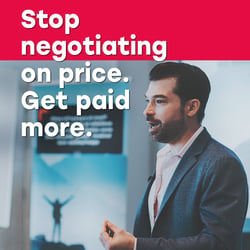5 Ways to Lose a B2B Sales Deal Before Making the First Pitch
Believe it or not, but most B2B sales professionals ruin their chances of closing sales deals before even making a formal sales pitch!
They go through lead generation, cold outreach, and maybe have one or two sales meetings, but before they know it, their qualified leads are:
- Ghosting them; or
- Hitting them with a 'No thanks, maybe later'!
When this happens, most B2B salespeople believe that it's their cold calling tactics or some other surface-level sales technique that's failing them.
However, not only are most surface-level issues not the real culprit, but most sales pros never get to the root cause of their dilemma.
That being said, we're sharing 5 errors that sales representatives make which crush their odds of closing deals before they even get to make a formal pitch! Each of these 5 errors has a single root cause that underlies the entire issue.
Not only that, but we're sharing how you can correct these errors to make it through an entire B2B sales cycle with a closed deal at the end!
Don't let your potential go to waste anymore by letting deals slip out of your hands seconds after initiating the selling process.

Here’s Why You Lose Potentially Great Deals so Early on…
To put it very simply... The reason why you lose so many potentially great sales deals so early on in the selling process is because you're not exercising control over the sale.
Instead of exercising control, you willingly hand all your power over to leads! As a result, you never even get to make a formal sales pitch.
Resonate with you at all?
Ask yourself how often you feel completely out of control with the sale, or how often you feel like you're at the constant mercy of your prospect's illogical decision-making process?
So, if you want to make it through the entire sales pipeline to where your prospects make a purchasing decision in your favor, then you need to take back power.
Each of the following 5 fatal errors are rooted in lack of power. Whenever you make one of the errors, you're unknowingly handing power over to the prospect on a silver platter.
Nothing good EVER happens when the prospect is in control of the sale...
1. Abiding By a Traditional Sales Funnel
So, let's say that you're a religious follower of the OG sales funnel. Specifically, the one with the following phases:
- Awareness
- Consideration
- Intent
- Purchase
- Retention
Traditional sales funnels set you up to fail because they take all the power out of your hands by making the entire sales-process a self-centered one. Instead of making it about understanding the prospect, the process is all about, ‘How quickly can I close on this lead?!’
The truth is that when you make the process about understanding the lead, power shifts back into your hands. And, of course, the central focus goes back to the lead.
It's not that you're using the wrong business-to-business sales tools or tactics... Rather, it's your funnel itself that is throwing you off!
This goes to show you that just because seemingly every other B2B company abides by a specific rule or utilizes a certain technique does not mean that it's the right thing to do! Moreover, just because everyone else is doing something does not make it right.
Bottom line: Throw your funnel in the trash if you actually want to make it to the final sales pitch AND secure the customer for good.

Typical Sales Funnels Are Self-Centered
When understanding sales leads is the central focus of your process, power falls back into your hands.
Unfortunately though, typical funnels have a self-centered approach, rather than a customer-centered approach.
Here's why: The first stage of the funnel, awareness, is all about making prospects aware of you and the fact that you have this great solution to a problem that they are telling you about. Then, you move into the consideration and intent phases in which you showcase all you have to offer to the prospect to solve the problem that they told you they have. Finally and hopefully, the prospect chooses you instead of your competition to solve their problem.
Now, there are a couple of major, self-centered-related problems here, including:
- The awareness stage is about making the prospect aware of you instead of you getting to know the prospect
- The awareness stage requires the prospect to put in work to tell you all about their problem instead of you showing the prospect the problem
- The consideration and intent phases continue to make it all about you, as you showcase your offerings instead of getting to know the customer
As you can see, traditional funnels make the selling process all about you instead of the customer, which is totally wrong.
With the spotlight on you instead of the prospect, all control falls into the hands of the prospect, because they control where the spotlight shines.
Exchange Your Funnel for This Simple B2B Sales Process
At this point, what you need to do is throw your funnel in the trash.
As you can see, traditional funnels are sales rep-centric instead of prospect-centric. They inform a process that makes selling all about you showing off how great you are instead of making it about understanding the prospect.
That being said, get rid of your funnel and exchange it for this simple, straightforward sales process that puts all the focus back on the B2B lead:
- Qualify your lead and set a hook for them
- Analyze the prospect and propose a solution to the problem
- Hype up their sense of urgency and close the deal
- Execution
The great thing about this particular process is that it's much shorter than typical ones. Believe it or not, but longer sales cycles are another factor that make prospects want to run for the nearest exit.
Remember, just because every other B2B company in the world utilizes a traditional funnel DOES NOT mean that you should too. When you really think about it... If traditional funnels are so effective, then why do so many companies struggle to make it to the final pitch?

2. Handing Out Free Proposals Like They're Nothing
How often does this happen to you: Your prospect is aware of you and what you bring to the table. The decision-makers hit you with a 'Send us your proposal, then we can talk again next week.' You spend hours upon hours putting together the perfect proposal hoping that the prospect will like it! Then, one of two things happens... In a best case scenario, the prospect shows up for the next meeting but you feel like they're just window shopping you. Or the worst case scenario happens, in which the prospect ghosts you or hits you with a 'Thanks but no thanks'.
If you're like most sales pros, then this happens to you on the regular! And, not only is it frustrating, but it also:
- Forces you to spend hours developing proposals for no promised return
- Doesn't give you the opportunity to really show what you're made of
- Puts all the power in the prospect's hands
Doesn't something sound off here?
Handing out free proposals like they're nothing puts 100% of the sales power into the prospect’s hands. The moment that you send the proposal their way without getting anything in return is the moment that they own you.
Don’t Reduce Yourself to a Vendor Who Prospects Window Shop
Here's the thing: If you're okay with being referred to as a vendor, then feel free to hand out free proposals as if you're not spending hours developing them only to have no promised return.
Or, if you're like most business owners and sales pros, you want to be recognized for what you are: An expert at what you do. You're not a vendor… Instead, you're an expert in your field.
While you might have competitors, you believe that the value you bring to the table is similar to that of a surgeon who doesn't question their own ability to successfully operate on patients.
However, handing out proposals automatically reduces you to a vendor.
Think about it... Aren't you sick of sending out perfect proposals only to feel like prospects are simply window shopping and comparing you against your competitors?
If so, then simply stop putting yourself in a position to be window shopped!
Stop Wasting Time
So, what should you be doing instead of selling your soul to develop proposals that get you literally nowhere (AKA just wasting everybody's time)?
Simple... You should spend time asking prospects questions in order to understand them.
Think of it like this: When you walk into a doctor's office with back pain, what does the doctor do? Do they dominate the conversation, or do they let you explain the symptoms you're feeling before diagnosing you and offering solutions?
Just like how a doctor spends the bulk of their time understanding a patient's symptoms, you too need to spend the bulk of your time understanding the prospect's symptoms!
Believe it or not, but prospects will appreciate you so much more if you explain that you need to understand them better before putting a proposal out there. They will think to themselves, 'Wow, this person really wants to get to know us!', which means so much more than a stinking proposal that all of your competitors will throw out into the open.
Don't waste another second putting together proposals that only waste everybody’s time!

3. Letting Potential Customers Tell YOU What Their Pain Points Are
Perhaps the easiest way to lose a sales deal before you get the chance to make a formal pitch is by asking your prospect what their problem is!
Seriously, the moment you say, 'So what's your problem?' or 'Can you explain to me what your problem is?' is the moment that you slam the door in your own face. You might as well walk out the door yourself at that point!
Now, you might be thinking to yourself... But isn't that what I'm supposed to do? Aren't I supposed to simply ask prospects what their problems are and then deliver a solution?
NO.
In no way are you supposed to ask prospects what their problems are. Instead, your job is to tell them what their problems are!
Don't believe it?
Well, if your prospects know what their problems are and how to solve them, then why are you there? Why would they pay you to fix the issue if they know what it takes and have the resources to handle it?
The moment that prospects start telling you the ins-and-outs of their problem is the moment that you lose all of your power. Don't shoot yourself in the foot like that!
Only About 10% of Potential B2B Customers Understand Their Problems
Okay, fine... There are some prospects who know that they have a problem that needs fixing. However, that number really only amounts to about 10% of them, and that's being generous!
Put yourself back in the shoes of a surgeon... When patients come to you, they're not there to self-diagnose. Rather, they're there to tell you what their symptoms are and for YOU to thoroughly explain the problem at hand. Sure, there might be some cases in which your patient is speculating about what's going on, but that doesn't mean that they're right or know what to do about it.
That's your job!
Your job is to listen to the symptoms, and then offer your expert diagnosis and treatment. By doing so, you become irreplaceable in the prospect's eyes. They'll see you as somebody who they can't afford to lose.
Aren’t You Supposed to Be the Expert?
Experts are irreplaceable. Vendors are replaceable.
Experts always make it through to the final sales pitch AND get prospects to make buying decisions in their favor. Vendors are always hanging by a thread, feeling like they're at the constant mercy of their potential buyers.
Therefore, step up to the plate by embracing the expert you know you are! If you don't take on that role, then your prospect will. And, as you already know, that's a recipe for disaster!
From the moment you initiate the sales cycle to the moment that the prospect signs their name on the dotted line, solidify yourself as an absolute expert and authority in your industry. At the end of the day, experts are irreplaceable.

4. Blending In With the Competition
Are you afraid of the sales process?
Are you a sales pro who, while you're passionate about what you do, is afraid to step up to the plate and really show off what you're made of?
Regardless of what your answer is, the hard truth is that many sales pros are actually afraid of the sales process. Don't believe it? Consider this: A study at Harvard University recently revealed that almost 50% of sales reps are afraid of cold calling.
While the fear of cold calling is only a single data point, the hard truth is that most sales pros are afraid of really going all out with prospects! Even though they know what they have to do, they back into the weeds because they're afraid of:
- Failing
- Judgment
- Losing resources
What do they do to alleviate those fears?
Simple... They blend in with their competition. In an effort to hide from their fears, they back into the weeds with their competition because they see it as a safer spot to be than standing out from the crowd.
By blending in with their competitors, we mean that they mimic their:
- B2B sales strategy
- Brand messaging
- Sales approach
As a result, prospects don't see them as powerful individuals and resultantly take over the sale.
Before going any further, ask yourself if fear is pushing you back into the weeds. When you're hiding in the weeds, why would prospects take you seriously?
Create Your Own Unique Sales Approach
Don't you think that your prospects are more likely to stick with you if you make their buying process an enjoyable one?
Put yourself in their shoes... If you're going through the buying process and feel like the sales pros have zero personality, wouldn't you be less likely to want to work with them?
Of course!
That being said, when sales teams feel fear, they mimic their competition's sales approach, particularly elements of their personality. As a result, the buying process inevitably worsens.
This isn't a difficult equation to understand: You have a unique personality that literally nobody else on earth has. Not only is it totally unique to you, but when you lean into it, you're truly being your best self. When you are your best self, customers feel just how genuine you are. The more genuine you come across, the more likely they are to work with you.
On the other hand, if you mimic your competitor’s personality, not only do you no longer stand out, but you also come across as ingenuine.
There's no way to get around it: Fear will crush you long before you have the chance to make a formal sales pitch. Fear backs you into a corner in which you look just like your competition. What part of that makes you think that a prospect will want to work with you?

5. Not Creating Any Sense of Urgency
Do you really know what motivates prospects to make purchasing decisions?
Prospects are motivated to buy because of their emotions!
When it comes down to it, what really pushes them through the sales pipeline and ultimately gets them to sign a deal is their own emotions.
Unfortunately, most sales reps try to sell based on facts and logic rather than emotions. Before they know it, prospects are walking out the door as if there isn't someone there trying to help them.
So, if you want to make it through the final sales pitch and get prospects to sign with you, then you need to play to their emotions. More specifically, you need to build up a sense of urgency!
Urgency is the emotion that'll push them over the edge. When leads think to themselves... 'Wow, if we don't take them up on this offer, then X, Y, and Z, is at stake', then you've successfully built up a urgency.
If nothing is at stake, then why would there be reason to buy? For example, if there is a crack in your roof but you don't realize that having a small crack can lead to the entire thing caving in, then what would motivate you to fix it?
There is no final pitch or closed deal without a sense of urgency.
Use Emotions to Your Advantage
Are you one of the many sales reps who feels guilty by trying to create a sense of urgency?
If so, then consider this: Your prospects are going to be emotional regardless of whether or not you hype up urgency.
Therefore, you might as well use emotions to your advantage!
Since prospects always base their decision-making process on emotions, then foster the kind of emotions that motivate them to get their problem fixed.
At the end of the day, you're using their emotions to help them fix an important issue of their own, and there is no shame in that.
Pounce When Urgency Is at Its Highest
The moment that the prospect's sense of urgency is at its highest is the moment that you need to lay the deal down on the line.
If you wait until after their emotions start to level out again, then they'll come up with a thousand reasons to not go with you for their solution.
Before you know it, they'll start thinking to themself... 'Ok, my roof is cracked and it might cave in, but maybe I can hold out for just a little bit longer!'.
Don't you think that if somebody's roof is about to cave in that you would strike when their emotional iron is at its hottest?
Of course you would.
Therefore, build up your prospect's sense of urgency as much as you can during the final pitch if you want them to close then and there. If you wait any longer, the deal could slip out of your hands.
Final Thoughts on Losing Deals Before Even Making a Sales Pitch
If you're tired of letting what could be perfect sales deals slip out of your hands before you even get a chance to show what you're made of, ask yourself if you're making one of these 5 fatal errors.
Be sure to look below the surface by asking yourself whether or not you're giving up all your power to the potential B2B buyer. Because, don’t forget that forfeiting power is at the core of each of these 5 errors!
You'll never get a chance to make a difference in the world if you let prospects slip out of your hands so early on in the B2B selling cycle... Whether or not you lose the deal right off the bat is all in your hands.
You May Also Like
These Related Articles

10 Reasons Why You Should Trash Your B2B Sales Funnel

5 B2B Sales Closing Techniques With Zero ROI




